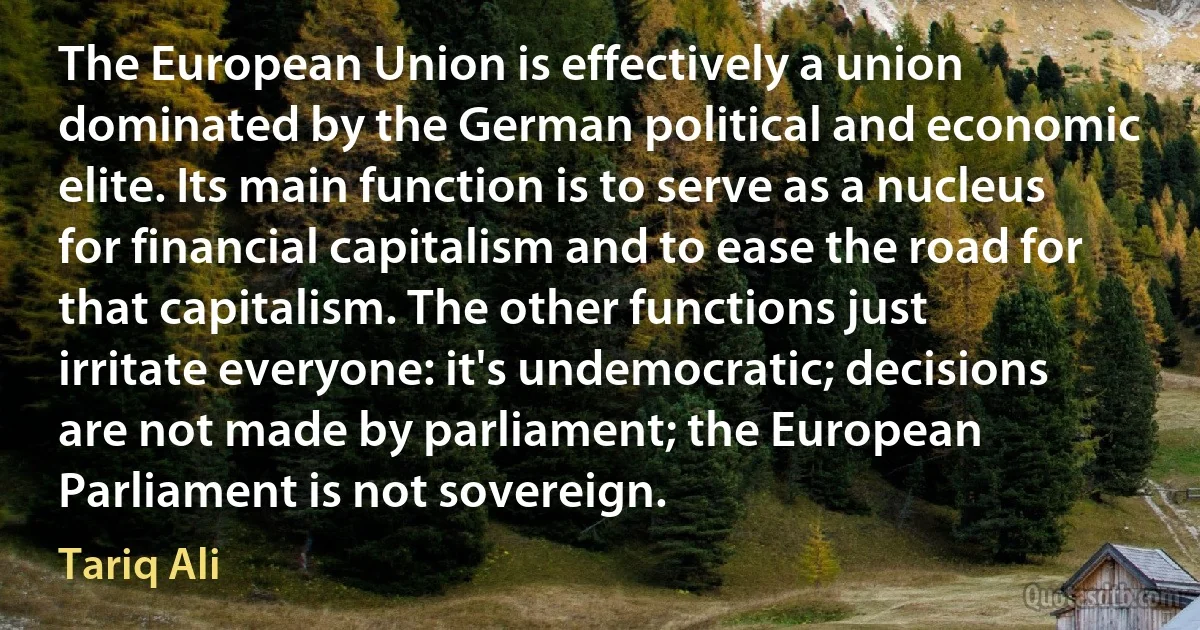Tariq Ali quotes - page 5
In many parts of the world, including the Arab world, the Latin American world, and even parts of the Western world, there is a tradition of writers being quite engaged. Particularly in the Arab world you have had very, very strong traditions of literature and poetry and most of the writers have been deeply committed to the cause of the Arab nation.

Tariq Ali
And then the burnt houses. How were they burned? I would ask the locals. Back would come a casual reply. 'They belonged to Hindus and Sikhs. Our fathers and uncles burnt them.' But why? 'So they could never come back, of course.' But why? 'Because we were now Pakistan. Their home was India.' But why, I persisted, when they had lived here for centuries, just like your families, spoken the same language, despite the different gods? The only reply was a sheepish grin and a shrugging of shoulders. It was strange to think that Hindus and Sikhs had been here, had been killed in the villages below. In these idyllic surroundings, the killings and burnings seemed strangely abstract to our young minds. We knew, but could not fully understand, and therefore did not dwell on these awful events till much later.

Tariq Ali
I wrote and spoke and appealed for support, but the West remained silent. Nixon had ordered Kissinger (or perhaps it was the other way round) to 'tilt towards Pakistan'. Beijing tilted in the same direction. As the war raged, millions of refugees were provided with temporary accommodation in the Indian province of West Bengal. Finally, the Indian army crossed the border and defeated its Pakistani counterparts.

Tariq Ali
The centre of the town was swathed in red flags. It was my first demonstration and one that I remember to this day. The city was Lahore, which for many centuries had been a much envied metropolis in Northern India. Then the last conquerors had departed, leaving behind a divided subcontinent. The old town had become part of a new country – Pakistan. The founder of this state, Mohammed Ali Jinnah, an agnostic, had cynically used religion to create a ‘Muslim nation'. Jinnah had expressed the hope that Pakistan would, despite everything, remain a secular state, but the logic of history had proved fatal. All the Hindu and Sikh families in Lahore had fled across confessional frontiers. Little ‘Lahores' had sprung up in Delhi.

Tariq Ali
Jinnah's Pakistan died on March 26, 1971, with East Bengal drowned in blood. Two senior West Pakistanis had, to their credit, resigned in protest against what was about to happen. Admiral Ahsan and General Yaqub left the province after their appeals to Islamabad had been rejected. Both men had strongly opposed a military solution. Bhutto, on the other hand, backed the invasion. "Thank God, Pakistan has been saved,” he declared, aligning himself with the disaster that lay ahead. Rahman was arrested and several hundred nationalist and left-wing intellectuals, activists, and students were killed in a carefully organized massacre. The lists of victims had been prepared with the help of local Islamist vigilantes, whose party, the Jamaat-e-Islami, had lost badly in the elections. Soldiers were told that Bengalis were relatively recent converts to Islam and hence not "proper Muslims”-their genes needed improving. This was the justification for the campaign of mass rape.

Tariq Ali


